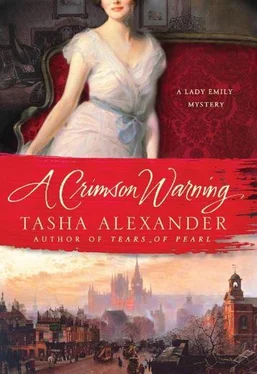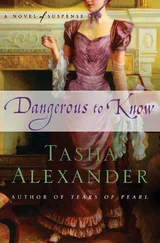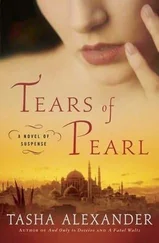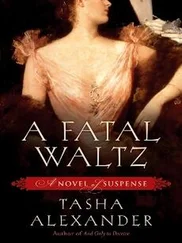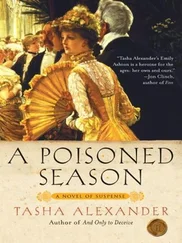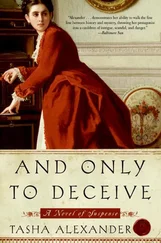“Did the police examine these?” I asked.
“They did, madam.”
“Did they take anything from the house?”
“No. From what I heard them saying, it appears they believe anything pertinent to the crime would have been at the warehouse with Mr. Dillman. That’s not to suggest, madam, they were not thorough when they were here.”
Colin had told me as much earlier. “Would it be all right for me to take these?” I asked, holding up the notebooks. “I’d very much like to share them with Mr. Hargreaves.”
“I don’t see why not, madam,” he said. “Mr. Dillman’s brother is abroad and won’t be able to reach London for at least another fortnight. I can’t imagine he’d object.”
“Thank you. Would it be too much to see your master’s dressing room?”
Three quarters of an hour later I’d left the house, satisfied I’d missed nothing. With me, I carried the notebooks and a scrap of paper I’d located in one of Mr. Dillman’s jacket pockets. A scrap of paper I hoped would prove to be our first significant clue.
I was convinced the sequence, M E E A M & M E O A O A M E, written on the paper I’d found in Mr. Dillman’s coat pocket were references to departments in the British Museum. I told Colin about the game Cordelia had played, and he agreed with my deduction, but was quick to point out these letters could have been used by Mr. Dillman ages ago. Regardless, without more than just them, we had no way of using the information for any further purpose. Colin set himself to search through the notebooks and continue his investigation of the dead man’s business dealings while, at his urging, I applied myself in another direction. I had learned when it was time to leave matters to him, at least temporarily. Marriage is a delicate balance, particularly when spouses work together. Colin and I had, after a certain amount of unsuccessful push and pull, found our way to contentment in this department. I was not about to disrupt it. Lady Carlisle had left a stack of pamphlets for me, and I was happy to head to Westminster to deliver them to the unsuspecting Conservative MPs.
Tall plane trees brought welcome shade from the heat of the day as I made my way through Green Park, then crossed the wide Mall and stepped into St. James’s Park, where bright blossoms lined the paths and ducks and swans zoomed through the lake. The two parks, with Buckingham Palace between them, made for one of the prettiest parts of London, but today everywhere I walked the mood was tense. No scandal had yet been revealed to explain the red paint left on the Musgrave and Riddington houses, but this had not provided relief for the families. If anything, it had ratcheted up tension even further. Society was rife with speculation as to what secrets would come out, but even as gossip spread, people began to worry they, too, would be subject to similar unwelcome attentions.
The Beau Monde were watching each other in ways they hadn’t previously. They were more on guard, more skittish. A couple walking a few paces in front of me broke apart with an almost violent force. “Why would you tell me such a thing?” the young woman cried as she pulled away from her companion. There could be no question of the gentleman’s motivation. He thought it preferable to tell her himself before he found himself exposed in an indecorous manner. I wondered how many people were making unwelcome, and possibly unnecessary, confessions and destroying lives.
Or were these confessions unnecessary? If someone had told a lie or deceived their partner, in life or business, did that partner not deserve to make an informed decision about continuing the relationship? Would ignorance be preferable? I frowned, crossed Horse Guards Road, and continued on to Westminster, where I asked for Mr. Reginald Foster. Mr. Foster, a schoolmate of Colin’s, was touted as having the brightest political future of any man in the history of the British Empire. He’d been universally adored at Eton—elected to Pop and Library in his first year, the darling of every hostess in Windsor, best oarsman in memory—and had finished Cambridge with double firsts in history and classics.
There seemed to be no limit to what this man could accomplish. He spoke seven languages fluently (although he himself counted only six, as he insisted Latin could not really be spoken in modern Europe), dedicated a great deal of his not insignificant fortune to charitable causes, and had proved himself a more than adequate painter during the two years he spent traveling on the continent after finishing at university. Most significant to me, at the moment, however, was the fact he had promised he could gain me admission to the offices of the Conservative MPs.
“Lady Emily,” he said, stretching his arms to me as he approached. “What a delight! You’re even lovelier than I remembered. Marriage agrees with you.”
“I thank you for the compliment,” I said. “But you, sir, are nothing like Aristophanes led me to expect. A popular politician, according to him, has a horrible voice, bad breeding, and a vulgar manner.”
“I’m glad, then, to disappoint you,” he said. “I was so pleased when Hargreaves got in touch. Excellent man. I remember him from school, though he was, of course, considerably younger than I. Wouldn’t have it in me to refuse his request I help you, even if I didn’t agree with what you’re doing.”
“You support suffrage?” I asked.
“I do. Seems foolish to reject the input of so many bright minds,” he said, meeting my eyes with an even stare. Mr. Foster spoke with such conviction I could almost believe he’d never engaged in so fascinating a conversation. Truly the man was a consummate politician. “Particularly that of my own wife. But I must warn you, my colleagues in the opposition will be terribly hard to convince. They view the entire movement as an attack on their ability to properly look after their ladies. Why should women need the vote if their men are dedicated to protecting them?”
“A terrifying thought.”
“Quite,” he said. “Right or not, many gentlemen believe letting ladies into the realm of politics would take away from their beauty and charm.”
“Ladies are more than beauty and charm,” I said. “And to suggest they’re not already firmly embroiled in politics is absurd. I can’t count the number of wives I know who are renowned as political hostesses—Liberal and Conservative.”
“Entirely true. But a social role, however influential, is not the same as an official one,” he said. “Come, now. We’ve much to do.”
As he led me through the wide corridors of the Houses of Parliament, my stomach rolled itself in knots and I began to question the wisdom of my strategy. Would it have been wiser to interact with these men at social functions instead of the workplace? I drew a deep breath, pressed my lips hard together, and stood as erect as I could. This last action made me realize the one ground upon which Mr. Foster might be disappointing. He was not so tall as he undoubtedly hoped.
For nearly two hours he guided me from office to office, providing introductions to countless Honorable Members, whose reactions to Lady Carlisle’s pamphlets ranged from outright horror (“Get the bloody woman out of here!”) to willful misunderstanding (“What a fascinating story. Are you still reading Greek?”). I hadn’t expected to win converts on my first day—only to identify candidates for further indoctrination. Which was why, after handing over the slim document and gauging the recipient’s reaction, I smoothly transitioned to other subjects.
Subjects like literature. A gentleman interested in the works of the American transcendentalists couldn’t possibly be too closed-minded. Two promising leads there. The Right Honorable Member who cited “The Wife of Bath’s Tale” as his favorite not only amongst Chaucer’s Canterbury Tales, but also amongst all writing—an opinion expressed after explaining how the great author “knows women like no other man”—would never come around to a more enlightened point of view … at least not in my lifetime. Given his advanced age, it seemed a hopeless business.
Читать дальше
